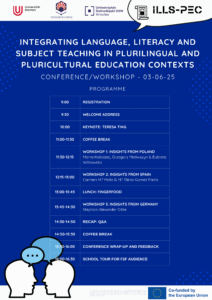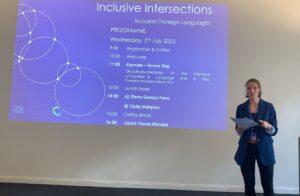Integrating Language, Literacy and Subject Teaching in Plurilingual Education Contexts
Conference/Teacher training opportunity
in Delmenhorst, 03.06.2025
We warmly invite you to join our Conference on innovative approaches to plurilingual education “Integrating Language, Literacy and Subject Teaching in Plurilingual Education Contexts”
Discover two open-access MOOCs, developed through international collaboration and available in four languages, designed for teachers, cultural assistants, and future educators working in multilingual settings.
Learn from practitioners how to integrate language, literacy, and subject content in an inclusive, anti-discriminatory way, and receive international certification.
The Keynote Speaker, Prof Dr Teresa Ting, Will Present On “Inclusion Through A Focus On Disciplinary Discourse:
An Example From Upper Secondary STEM”
Join Us In Person or Online!
This event is a hybrid experience, offering you the flexibility to participate either in person or virtually via ZOOM. Choose the format that suits you best and join us for an engaging experience!
There will be a single Zoom link for the event, allowing you to pop in and out of the sessions you wish to attend.
The Zoom link will be sent to you via email before the event.
REGISTER: https://illspec.com/en/registration-3/


AILA 60th Anniversary World Congress Kuala Lumpur 2024
Symposium: Inclusive Foreign/Second/Additional Language Education: Cross-Cultural and Interdisciplinary Perspectives
in Kuala Lumpur, 13.08.2024
Overview: The focus of this symposium lies on cross-cultural and interdisciplinary perspectives on how to create inclusive foreign/second/additional language learning environments, i.e., how to reduce “barriers to learning and participation” (Booth & Ainscow, 2002, p.3), seek equity, and make engagement in language education accessible to all students. We adopt the broad view of inclusion, which focuses on all students, including marginalized groups, and is thus not limited to those with disabilities (Thomas, 2013). We assume that learner diversity should be viewed as an asset in the foreign/second/additional language classroom and perceive it as an umbrella term that encompasses a range of differences observed at school, e.g., neurodiversity, cultural and linguistic variation, multilingualism, specific learning differences.
UNESCO and other international human rights organizations have been advocating the implementation of education systems that eradicate exclusion from educational opportunities based on socially perceived differences. While e.g., many European countries have acknowledged the importance of these efforts (Haug, 2017), constructing school systems that live up to the ideals of inclusion is still an on-going process. Reaching marginalized groups requires the development and implementation of effective inclusive policies, programs, and teaching solutions. As pointed out by the European Agency for Special Needs and Inclusive Education (2014, p.5): “The current debate is no longer about what inclusion is and why it is needed; the key question is how it is to be achieved”.
Observations in the field of educational science emphasize that institutionalized education generally tends to be stable and robust in terms of its organization and structure (Tyack & Tobin, 1994). Factors such as teachers’ gender, years of experience or education can prove insignificant when teachers adjust to their new environments and feel that they must adopt the existing curricula and practices. If we assume that various educational systems around the world have established their robust local traditions and structures in the course of their histories, including their own approaches to inclusive (foreign/second/additional) language education, it is plausible that foreign language teachers involved in these systems experience their workings in idiosyncratic ways. Any attempt to understand these mechanisms needs to include multiple perspectives that come from various local/cultural teaching contexts.
Thus, this symposium centers on the questions how principles of inclusive education are interpreted and implemented in different language education contexts; what role various forms of learner diversity play in cross-cultural language education; what attitudes towards inclusive language education are expressed in various cultural contexts; what types of support systems and teaching solutions can be/have been proposed and implemented in inclusive language education and in what settings they can be considered effective.
Speakers:
- Lea Fischer (University of Bremen): In search of didactic guidelines for inclusive ELT – Designing inclusive lessons using the Storyline Approach
- Joanna Nijakowska (University of Warsaw) and Dina Tsagari (Oslo Metropolitan University): Enhancing inclusivity and accessibility in language teacher education: Curriculum and material development
- Maria Elena Gomez Parra (University of Cordoba): Translanguaging seen as a tool for inclusive second language learning by future teachers of English
-
Magdalena Szyszka, Marzanna Pogorzelska & Elzbieta Szymanska-Czaplak (University of Opole): Perceived Effectiveness of the TOOLS Project Training for Inclusive Education at the Tertiary Level of Education
- Małgorzata Baran-Lucarz (University of Wroclaw): VInDOW: Digital Tools for Inclusive Foreign Language Education” – Presenting materials for developing FL teachers’ inclusive teaching skills
- Joanna Pfingsthorn & Julia Weltgen (University of Bremen): Psycholinguistics in the inclusive classroom: Eye tracking as a diagnostic tool to observe language processing in German foreign language education
The networks In+ and AILA ReN “INCLUSIVE FOREIGN LANGUAGE EDUCATION” as well as the Erasmus+ „V:In:D:O:W“ Project Team held the scientific conference:
Inclusive Intersections
Holding the mirror of inclusion to subject content during initial and in-service foreign language teacher education
in Bremen, Germany 4-7th July 2023
European educational policy makers envision the development of communicative competence as the main goal of institutionalized foreign language (FL) education (Council of Europe, 2001) and hope for the realization of the Barcelona Summit (2002) “mother tongue + 2” objective. Yet, the relatively long list of various subcompetences, types of knowledge and affective variables that communicating in a foreign language encompasses, highlights how complex and multidimensional the process of learning a foreign language can be and, therefore, how difficult it is for everyone to learn foreign languages easily, in a comparable manner and with similar success. In fact, learning a foreign language can often prove challenging for learners.
Since the ratification of the UN Convention on the Rights of Persons with Disabilities (UN CRPD) the implementation of inclusive education systems that enable all learners to actively engage in learning and reach their potential is a goal recognized by all European Countries. However, on a practical level, not all educational systems and not all agents within them are truly ready to realize such task in practice. Especially considering the assumption that pre-service teachers need to be ready to teach in inclusive school systems, it seems necessary to provide them with appropriate education and training during their studies. Yet, this is often not the case – especially the link between subject teaching methods and inclusive educational approaches is often missing, although the interlocking of these fields is highly important for the teaching practice: in a survey of student teacher’s course catalogues Frohn & Moser (2021) show that while almost all universities included in the study indicated that they had courses on inclusion, these were often not focused on inclusive provision of subject content.
During this conference, we aimed to focus on approaches and concepts for the training and further education of (prospective) teachers, which provide inclusive approaches and concepts for the design of foreign language teaching. In terms of content, a distinction was be made between approaches to in- and pre-service teacher education.
Conference organization team:
- Michele Daloiso (University of Parma)
- Maria Elena Gómez Parra (University of Córdoba)
- Małgorzata Baran-Łucarz (University of Wrocław)
- Joanna Pfingsthorn (University of Bremen)
- Julia Weltgen (University of Bremen)
- Heiner Böttger (Catholic University of Eichstätt-Ingolstadt)
- Bianca Höppner (Catholic University of Eichstätt-Ingolstadt)



——